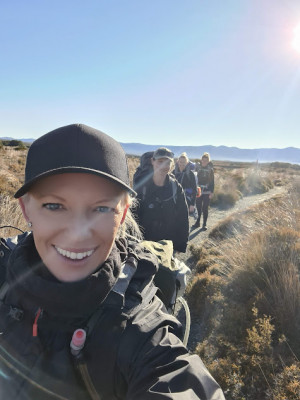Te Wiki o te Reo Māori: Applying Your Goals Outdoors
Te Wiki o te Reo Māori (Māori Language Week) has arrived and provides an opportunity for Aotearoa to learn and share their progress in learning and applying Te Reo. This year also marks an important anniversary of 50 years of the Māori Language Petition which led to many of the kaupapa (policies) in place today which integrate Te Reo into our everyday lives.
Getting outdoors and connecting with nature is one of the many great ways people can practice their skills. Below we have introduced our newest team member and her journey in learning, as well as a few useful resources we have found online to help you upskill!
Have fun and remember, Haria ko ngā maharatanga anake, waiho ko ngā tapuae anake - Take nothing but memories, leave nothing but footprints.

A learning journey:
Our newest MSC member, Sarah Topliff, shares her journey and motivation to learning Te Reo with her family:
I started learning Te Reo when my son came home from kindy talking about going on a hikoi, his favourite putiputi, or who was the rangatira that day. I embraced the idea of joining him on his journey to becoming bilingual and am so grateful that Māori allow us to use this beautiful taonga. We started with colours and numbers; now we have a range of kupu and sentences we use, and we challenge ourselves constantly to use as much as we can. I love that Aotearoa is embracing Te Reo in our everyday lives; it sets us on a path to be a truly bilingual nation, which will be a wonderful thing.
Helpful Te Reo Māori resources to support your trip:
Sort your food for the trip:
- Pamphlet of the dictionary of food from Tio Tangata
Improve your pronunciation:
- Here link a link to a list of Te Reo Learning apps from Health Navigator, designed to help you easily improve your knowledge, and have fun while doing it!
NZ Mountain Safety Council resources:
Point out things like manu (birds) on your hikoi (walk):
Did you know many were named by Māori by their behaviours, call or feathers. Hence a kueuwhengu (shoveller duck) means ‘snuffle’ as it sieves water to feed and makes a snuffly noise.
- Papers past article on bird names
- Te Ara Government Māori Bird names
- Find out more about native and non-native species here on DOC’s website
Find a place to go:
- Get Plan My Walk to find tracks and pāhoka (huts)
- Check out this Maori Language map of Māori place names
Card games for the hut:
Other cool resources:
- Taiao Booklet by DOC and Ministry of Education helps you learn more about Aotearoa’s taonga in the natural world
- Learn more about Māori Language week and ways you can engage you and your whanau!
Have fun and stay safe out there. header photo: Jonty Crane, Mangawhai Cliffs Walkway, Northland